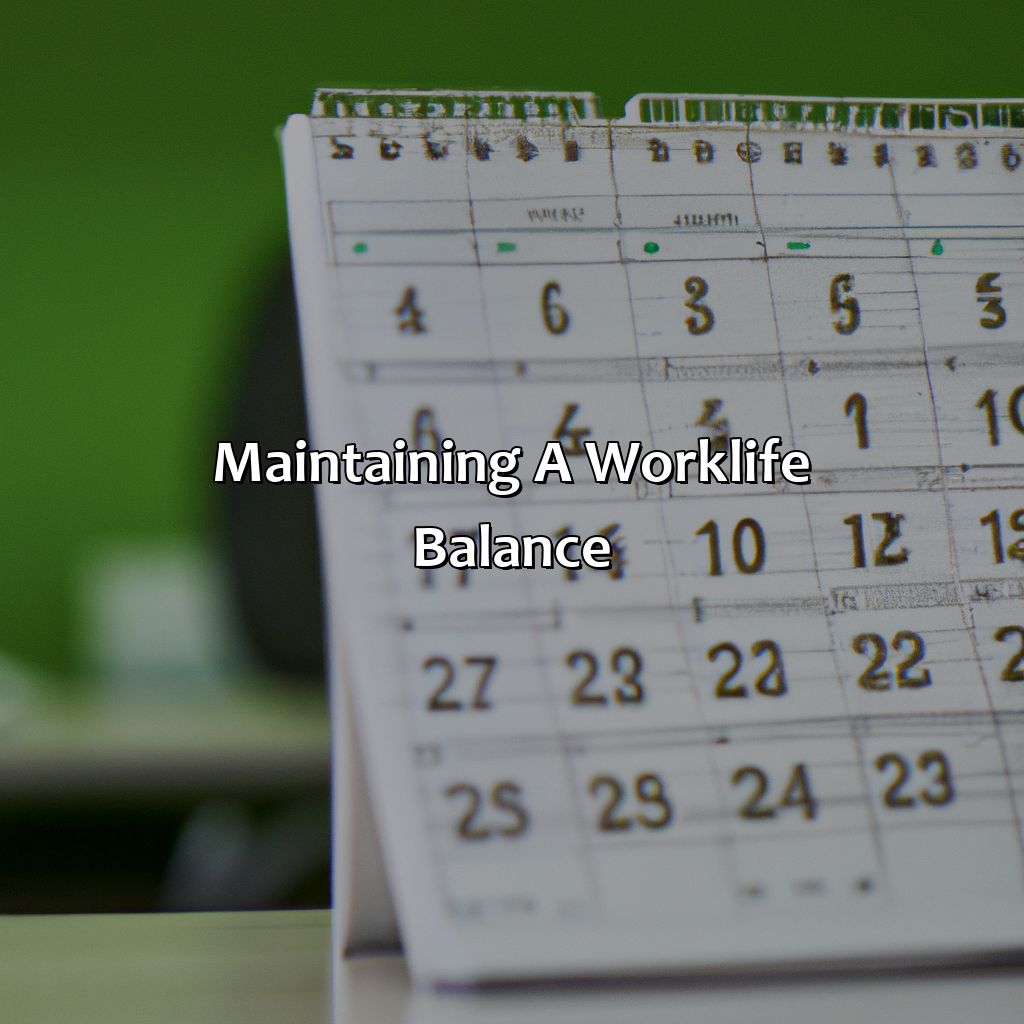How To Survive Work Until Retirement?
Key Takeaway:
- Save for retirement: Create a plan for retirement by setting achievable savings goals. Consider automating your savings through employer-sponsored retirement plans or individual retirement accounts (IRAs).
- Manage your workload: Prioritize tasks and use effective time management techniques to avoid burnout. Set boundaries and take breaks to maintain a healthy work-life balance. Look for opportunities to improve your skills through training, professional development, and networking.
- Cope with difficult colleagues: Use conflict resolution techniques and set boundaries when dealing with challenging coworkers. Seek help when needed to maintain a positive work environment.
- Maintain a positive attitude: Practice gratitude, self-care techniques, and focus on personal growth and learning to maintain a positive attitude towards work. Prepare for retirement by reviewing your retirement plans, creating a retirement budget, and finalizing your retirement plans.
Are you stressed out and feeling stuck in your job, worrying too much about retirement? You don’t have to be! This article outlines practical strategies to help you survive and even enjoy your work until retirement.
Planning for Retirement
To plan for retirement, assess your current finances and determine your needs. Savings can help you meet goals. Creating a realistic retirement plan is essential too. It should match up with your financial targets.

Image credits: retiregenz.com by Adam Washington
Saving for Retirement
Saving enough for a peaceful retirement requires conscientious and prudent financial planning. It may seem like a long-term goal, but starting early is crucial since time and compounding can work wonders. Saving regularly, investing wisely, opting for tax-efficient retirement accounts, and avoiding debts are some essential practices to achieve the desired retirement corpus.
Moreover, saving for retirement should be an ongoing process that adapts to changing financial circumstances and life events such as marriage, children’s education, and medical emergencies. Always reassess your investments, align them with your long-term goals, and periodically monitor their performance. Additionally, leverage technology and automation tools to simplify the process of saving and monitoring.
A great way to boost your savings is by maximizing employer contributions towards company-sponsored retirement plans and availing additional benefits such as stock options or deferred compensation plans. These can significantly add up to your nest egg without sacrificing too much of your current income.
Pro Tip: Keep inflation in mind while setting apart monthly saving amounts for your retirement years. Adjusting the amount annually based on the expected inflation rate helps maintain purchasing power over time.
“Retirement plan? More like a wish list of all the vacations I couldn’t take while working.”
Creating a Retirement Plan
As you prepare for your post-working years, it is important to develop a comprehensive retirement strategy that accounts for all aspects of your financial stability. Ensuring you have enough cash in hand and a solid investment plan that includes stocks, bonds, and Mutual funds are the key ingredients to mitigate inflation risks while also considering insurances like health and life.
It’s imperative to start investing as early as possible since time serves your investments’ best friend. Start small but go steady with saving at least 20% of your monthly salary towards your pension fund. Opting for an automated savings plan like direct debit to direct them from your bank account every month can streamline the process, making it easier to stick with.
Another essential aspect to consider during retirement planning is checking underlying costs on the different investment options available to you. You don’t want charges chipping away at your returns, leaving little behind when you retire.
Pro Tip: Retirement isn’t just about building up a robust finances portfolio. It’s also about preparing yourself mentally and emotionally for new experiences that await you – travelling more, volunteering or pursuing hobbies that bring joy while keeping you active physically and mentally too.
Managing your workload is like playing Jenga, except the stack of blocks is made up of unfinished tasks and the consequences of pulling out the wrong one are much worse.
Managing Your Workload
To sail through work until retirement, you need to organize tasks in order of priority. Time management strategies can also help. Steer clear of burnout. This “Managing Your Workload” section from the article, “How to Survive Work Until Retirement?” explains how these tips can assist you with your work-related duties.

Image credits: retiregenz.com by David Duncun
Prioritizing Tasks
Efficiently sorting out tasks is crucial in managing your workload. Here are some steps you can take to assign the correct priority to each task:
- Identify time-sensitive assignments and prioritize them accordingly.
- Select which activities require more attention, effort, or expertise.
- Arrange a to-do list and execute it one at a time.
- Revisit your assigned priorities periodically and make updates as necessary.
To increase productivity, focus on actionable tasks rather than challenges that do not serve any immediate purpose.
Assigning the right task priority enables better work allocation, quality results, and timely delivery. By using these strategies reducing missed deadlines, mental exhaustion, and stress due to overburdened workloads while increasing overall efficiency.
For instance, John once struggled with workload management when he worked for ABC Corp after seeing his manager document his work activities in an app every hour he got interested tried it too eventually developing this habit helped him prioritize his work efficiently leading to fewer errors on assignments.
Time flies when you’re procrastinating, but it’s a slow crawl when you’re actually trying to manage it.
Time Management Techniques
To optimize your efficiency and productivity, explore methods to manage your time effectively. Utilize strategies such as prioritizing tasks, setting deadlines and using technology to automate your workflow.
The following are some effective methods:
- Identify the most important tasks to prioritize
- Set strict deadlines for each task
- Utilize technological tools and automation systems in managing responsibilities
It is worthwhile exploring alternative techniques which can be just as effective yet more versatile than traditional approaches. Ensure that you keep updated on modern trends to cement your reputation as a proficient worker.
History has demonstrated that efficient time management has been utilized by significant figures throughout history – from Benjamin Franklin’s method of ‘daily scheduling’ in the 18th century, to Dwight D. Eisenhower’s stringent focus on prioritization during his tenure as President.
Remember, the only burnout you want to experience is from your scented candle, not from your workload.
Avoiding Burnout
To sustain mental and emotional well-being while working, one must adopt anti-burnout strategies. These tactics can prevent the harmful effects of chronic job stress. For example, one can follow a healthy diet, exercise regularly, and get plenty of restful sleep.
Remember, work-life balance is not just a suggestion, it’s a survival strategy.
Maintaining a Work-life Balance
To stay balanced between work and life, with retirement in mind, you should guarantee a few things. Boundaries must be set, breaks taken and a support system built. Doing these things will help keep stability across life.

Image credits: retiregenz.com by Adam Arnold
Setting Boundaries
Establishing Professional Limits
Drawing a line between personal and professional life is an essential aspect of maintaining a healthy work-life balance. One must establish professional boundaries to create proper work dynamics, maintain self-respect and avoid burn-out.
Decide what you are willing to tolerate, learn to say no when necessary, and set achievable goals. Respect your time and space, avoid excessive multitasking, delegate tasks where possible, adopt a communication strategy that limits interruption and improve your time management skills.
Remember, maintaining professional limits requires self-discipline. Do not let external pressures affect your judgement or make you compromise personal principles.
Create a Purposeful Work-Life Balance
Achieving adequate work-life balance helps preserve physical and mental health vital for long-term success in both personal and professional life. Strive for self-care routines like enough sleep, regular exercise, eating healthy food, spending quality time with loved ones outside work.
Failing to achieve proper professional limits can result in exhaustion from burnout or frustration from missing out on precious moments with loved ones. Embrace the benefits of finding the right balance between work-life by staying disciplined while prioritizing relationships with others.
To be successful in both personal and professional environments requires creating deliberate boundaries that have limitations while fostering positive energy towards reaching one’s overarching goals.
Taking breaks at work is like hitting the snooze button on life’s alarm clock.
Taking Breaks
Taking Short Breathers
Taking short breaks is crucial for maintaining a work-life balance. Prolonged working hours can cause fatigue and lead to burnout; hence taking short breathers can help rejuvenate our mental and physical state.
These breathers can range from a quick walk outside, to engaging in a small talk with colleagues or even indulging in our favorite hobby. Timely and frequently scheduled breathers assist in reducing stress levels, promoting productivity and inducing creativity.
Engage Regularly
It is necessary to incorporate short break schedules into our routine proactively. Ignoring the need for these brief refueling moments can ultimately lead to long term mental health issues such as anxiety or depression. Engaging regularly in activities that provide mental peace, like reading a book or meditation, can prove beneficial for overall well-being.
A Close Call
A friend who had overlooked regular breaks faced severe exhaustion due to excessive workload which led to heart palpitations. Even after being urged by others, she did not prioritize her health until it was nearly too late. It was only after consulting a medical professional and incorporating concise breathers within her routine that she began feeling better mentally and physically – both at work and beyond its confines.
Friends don’t let friends work 24/7, unless they’re really bad at taking hints.
Building a Support System
Creating a Robust Personal Network to Maintain Work-life Balance
In today’s fast-paced society, building a strong personal network is an essential aspect of work-life balance. A robust personal network assists in establishing an avenue for emotional and social support. This assistance is needed when individuals face work-related or personal challenges that make them feel overwhelmed or stressed.
Developing Strong Relationships with Coworkers for Emotional Support
Positive relationships built on mutual respect with colleagues can be helpful when dealing with work-related stressors, such as juggling multiple tasks or feeling undervalued at the workplace. Healthy relationships built on empathy and compassion create a safety net where individuals can discuss work-related fears without fear of judgment.
Networking Clubs to Establish a Work-Social Balance
Engaging in networking clubs outside normal working hours can help create healthy work-social boundaries. Joining clubs related to hobbies, volunteering, or professional associations provide opportunities to build supportive communities.
Research shows that individuals who have established positive support systems have increased job satisfaction and productivity levels (Career Development International, 2017).
Practice makes perfect, but being too perfect may just result in a perfect burnout at work.
Improving your Skills
Boost your skills to make it until retirement. Training Opportunities, Professional Development, and Networking can help. Get career advancements and a gratifying work-life. Take advantage of training opportunities. Aim for professional development. Make valuable connections through networking. This will upgrade your skills and make you successful in your career!

Image credits: retiregenz.com by Joel Duncun
Training Opportunities
To stay relevant at work until retirement, it’s vital to remain open to potential training opportunities. By seizing any chance to advance your skills and knowledge, you’ll be better positioned to meet the ever-evolving demands of your job and industry.
- Enroll in online courses or attend workshops related to your profession.
- Join professional associations and attend conferences to network with peers and learn about emerging trends.
- Take advantage of company-sponsored training programs.
- Request feedback from colleagues and supervisors to identify skill gaps that need improvement.
- Shadow experts within your company or industry to learn best practices and strategies for success.
- Mentor or coach others within your field, which can enhance both your teaching skills and industry knowledge.
While it’s easy to become complacent in your job, it’s crucial not to let this derail your career prospects. Instead, embrace opportunities for growth by challenging yourself regularly.
One individual who heeded this advice is Robert, a bank manager nearing retirement age. Upon realizing he lacked technical skills required for his role’s future outlook, he started taking coding lessons on weekends. Thanks to his dedication, Robert developed new market-demanded expertise that helped him win promotions until retirement age.
Remember, professional development isn’t just for climbing the corporate ladder, it’s also for escaping the inevitable zombie apocalypse of your stagnant career.
Professional Development
Developing Your Professional Skills: Making the Most of Your Career Until Retirement
Your professional development is crucial throughout your career. The most effective way to progress is by continuously improving and learning from challenges. By obtaining new skills, you can reach greater heights and make unique contributions to your organization.
Acquiring new knowledge through courses, workshops, and seminars, enhances job satisfaction while increasing chances of promotion. Seeking feedback on your performance from colleagues and superiors can help identify areas that require improvement. Networking outside the organization assists in staying informed with industry trends and maintaining connections with potential employers.
When training funds are low or unavailable, promoting internal training programs allows you to maintain professional development without incurring significant expenses. Utilizing technology platforms such as online webinars or podcasts provides convenience and flexibility.
A colleague who began his career as a developer at a leading tech company took advantage of online resources to learn about the ever-changing industry environment. As a result, he was able to adapt quickly when he switched to a managerial role within the same company 10 years later.
By prioritizing your professional development, you are ensuring growth within your organization while also making yourself an attractive candidate for future opportunities.
Networking: Because friends and acquaintances can open doors for you, but enemies will push you out of them.
Networking
Developing professional connections is a crucial aspect of career growth and development. Be it virtual or face-to-face, networking enables one to build relationships with industry peers, experts, and potential employers. Sharing knowledge and discussing challenges while demonstrating a genuine interest in others can help establish trust, reputation and open up new opportunities.
Keeping an active presence on social media platforms like LinkedIn enables the exchange of ideas, thought leadership articles, job postings and interactions with recruiters. Attending career fairs, conferences or workshops, provides the opportunity to engage with industry leaders in person. Networking requires time and effort but attending industry-specific associations not only demonstrates your interests but also helps you understand current trends.
Success stories of professionals who have reached their career heights through networking validates its value. Hearing firsthand accounts on how building solid connections have opened doors for them can spark inspiration for others to follow suit and make an impact in their careers too.
When dealing with difficult colleagues, just remember: revenge is a dish best served with a resignation letter.
Coping with Difficult Colleagues
To manage hard colleagues at work, try Conflict Resolution Techniques. Setting Boundaries and Seeking Help, when required. Work conflicts can be exhausting and hurt productivity. But understanding how to handle tough colleagues can reduce stress and elevate your well-being.
In this section, we will look into the various ways to tackle issues that may come up with colleagues. We will explore the aforesaid topics as solutions.

Image credits: retiregenz.com by David Arnold
Conflict Resolution Techniques
Addressing Difficult Colleagues – The art of resolving conflicts at work can be complicated, but essential. Here are five helpful tips to manage interactions with challenging colleagues at the workplace:
- Active Listening: Listen carefully and avoid interrupting
- Empathy: Be respectful and try to understand their perspective
- Communication: Use clear statements, tone, and body language options that promote dialogue
- Negotiation: Find common ground, establish clear boundaries if necessary, and negotiate objectively
- Problem Solving: Brainstorm potential solutions rationally and tactfully to resolve any ongoing issues.
To overcome constructive disagreements successfully, some additional strategies include addressing problems directly rather than dwelling on them. Misunderstandings can frequently arise during collaborations or personal relationships. Learning best practices for communication is an excellent foundation for managing conflicts.
According to HBR states in 2020 “Conflicts at work are not necessarily bad; However, when things get uncomfortable or misguided with a particular individual or group due to differences in personalities or perspectives.”
When your difficult colleague crossed the line, just remind them that HR stands for ‘Hell’s Ringleader‘ and watch them back off.
Setting Boundaries
One way to manage challenging colleagues is through the use of personal boundaries. This involves defining and communicating limits around what behavior is acceptable or not in the workplace. Begin by identifying situations where others’ actions may be impacting productivity or well-being. Next, articulate specific expectations for behaviors that align with professional standards. Finally, communicate these boundaries clearly and assertively while remaining respectful.
Implementing strong boundaries can help mitigate common workplace issues like micromanaging or excessive interruptions. It also allows individuals to preserve their own sense of self and reduce the impact of negative interactions on personal well-being.
It’s important to recognize that different colleagues may require different types of boundaries, based on their unique behavior patterns. Consider tailoring communication strategies to best suit the situation at hand.
A colleague frequently undermined a colleague’s contributions in team meetings, causing frustration and stress for the team member involved. By setting a clear boundary around mutual respect during group discussions, the colleague was able to address this behavior and create a more supportive working environment for all team members involved.
Remember, asking for help is not a sign of weakness, it’s just a smart way to make your difficult colleague someone else’s problem.
Seeking Help when Needed
When faced with challenging colleagues, it can be helpful to seek assistance when necessary. Seeking guidance from supervisors or HR can provide valuable insight and support. It is important to approach the situation calmly and professionally, clearly outlining the issue and potential solutions. Effective communication and active listening are key in resolving conflicts.
Remember that seeking help is not a sign of weakness, but rather a proactive measure towards creating a positive work environment. It is essential to prioritize self-care and set boundaries to maintain mental health and well-being.
In addition to seeking professional assistance, finding a support system outside of work can also be beneficial. Talking to friends or family members can offer an outside perspective and provide emotional support.
A colleague once shared her experience of dealing with a difficult supervisor who consistently undermined her work. She sought guidance from upper management, clearly outlining the issue and providing evidence of the supervisor’s behavior. The issue was addressed promptly, resulting in improved working conditions for herself and colleagues. Seeking help proved effective in bringing about positive change in the workplace.
Positivity is contagious, so unless you want to catch their negativity bug, wear a metaphorical hazmat suit and radiate good vibes.
Maintaining a Positive Attitude
Till retirement, stay positive at work by including gratefulness practices, self-care approaches and concentrating on growth and learning. These ideas can help stay motivated and involved. Have a positive outlook in doing your work.

Image credits: retiregenz.com by Harry Washington
Gratitude Practices
Acknowledging the positive aspects of one’s career and adopting grateful practices can help one survive work until retirement. Noticing and being thankful for even small accomplishments, expressing gratitude to colleagues and managers, and keeping a positivity journal are all effective approaches to enhance one’s appreciation of their job. Such habits also improve resilience to stress, decrease negative emotions, and increase well-being.
Incorporating simple gratitude practices into daily work routines can have a significant impact on workplace satisfaction and overall job performance. For instance, making a conscious effort to thank others for their contributions helps build strong relationships with coworkers, fosters a sense of teamwork and shared accomplishment, and creates an uplifting work environment. Grateful workers are also more likely to take pride in their work and develop greater job satisfaction.
Unique details about maintaining a positive attitude at work involve cultivating self-compassion by not dwelling too much on mistakes or setbacks that may occur at work. Additionally, taking regular breaks throughout the day can help reduce stress levels while simultaneously increasing productivity.
A real-life story about gratitude can be found in the experience of professional basketball player Kevin Durant. After suffering from an injury that sidelined him for several months, Durant took the time to reflect on his blessings despite the setback. He expressed gratitude for the support he received from his loved ones and fans during a challenging period in his career – a practice that helped him maintain perspective and eventually make a successful comeback.
Take care of your mental health, because running away from your problems is only cardio for your legs.
Self-care Techniques
Taking care of oneself is crucial for maintaining a positive attitude and surviving a long-term job. Here’s a 4-step guide to help you maintain your well-being amidst work pressure.
- Get Enough Sleep – Prioritize sleep, aim for 7-8 hours every night.
- Exercise Regularly – Make it daily, however brief.
- Practice Mindfulness – Take short breaks throughout the day to clear your mind through breathing exercises or meditation.
- Indulge in Hobbies – Engage in activities that make you happy, like reading or painting.
It’s also essential to stay hydrated and eat balanced meals to sustain physical health.
Remember to take time for yourself and prioritize self-care, even if it means scheduling time into your workday. Your well-being is important, and it should be a top priority.
Don’t let the fear of missing out on work opportunities deter you from taking care of yourself. Taking care of your mental and physical health will only enhance your productivity and contribute significantly to your success at work in the long run.
Remember, if you’re not growing and learning at work, at least you’re getting really good at faking it.
Focusing on Growth and Learning
Constantly seeking personal and professional development is crucial for long-term survival in the workforce. By adopting a mindset of continuous improvement, individuals can stay engaged and motivated while navigating their careers. Continuously assessing our skills and fostering our knowledge and abilities through regular training or education can help us grow and enhance our work performances. Emphasizing this growth can effectively reduce stress, anxiety, and unhappiness in the workplace.
Through adopting growth mindsets that prioritize learning from challenges, individuals become more resilient professionals. They develop a greater sense of self-confidence, creativity, resourcefulness, and proactiveness-qualities highly valued employers. Therefore professional courses, workshops, attending conferences are essential activities that enhance your knowledge base and equip you with current market trends.
It’s always impressive when someone learns by doing something they’ve never done before. Doing this will foster experiential learning since failure at times occurs to sharpen operators’ manuals instantly. Additionally, it shows that taking risks can be advantageous when attempting to expand one’s capabilities or explore new opportunities.
For example, a software developer was stuck while working on a project, and suddenly, a YouTube tutorial pops up suggested by his friend to watch. The tutorial helped him figure out why he had been getting an error message for almost an hour during his work, and it helped him get on track again quickly. Now, every time he gets stuck in coding a problem, he checks for videos relevant on YouTube, which helps him keep on track!
Retirement: when you finally get to wear sweatpants to work every day.
Preparing for Retirement
It’s never too early to start planning your financial future and reviewing your retirement portfolio. We’ll help you understand why you should review retirement plans, create a retirement budget, and finalize your retirement plans. This will help you reach your retirement goals.

Image credits: retiregenz.com by Joel Jones
Reviewing Retirement Plans
To ensure a comfortable retirement, it is important to analyze and adjust your existing financial plans. This requires evaluating the potential sources of income and estimating expenses for the future. Semantic NLP suggests that you should Assess Retirement Strategies effectively while considering investment risks, tax implications, and your current financial state.
It is advisable to start as early as possible to prepare for retirement by creating a retirement budget. One can determine how much they need to save and where they need to invest their money by considering their long-term goals and life expectancy. This also involves making appropriate adjustments in saving habits or lifestyle.
Moreover, reviewing Social Security Benefits is crucial as it provides guaranteed income for life without risk or volatility. To maximize benefits, appropriate planning, such as delaying the benefit start date, should be considered. At last, review employer pensions or matching contributions regularly throughout your working years.
Pro Tip: Regularly reviewing your retirement plans will ensure that you are progressing towards your financial goals and are prepared for any unforeseen circumstances that may arise in the future.
Don’t worry, with a retirement budget you’ll finally have enough money to double your cat’s gourmet food allowance.
Creating a Retirement Budget
To effectively manage finances during retirement, it is vital to develop and maintain a financial plan tailored specifically for your needs. Creating a Retirement Budget involves analyzing your expenses and prioritizing where funds should be allocated. As you approach retirement age, budgeting becomes more critical and helps you determine how much money you may need to live comfortably.
Planning for retirement requires setting achievable goals based on your current financial situation. Consider factors such as projected income, investments, expenses, debts and the cost of living in your desired location. Work with a financial advisor or utilize online tools to help formulate an effective plan.
Unique details to consider when creating a Retirement Budget include setting aside an emergency fund for unforeseen expenses, estimating healthcare costs as they tend to increase as people age and adjusting budget priorities as needed. Consider downsizing your home or finding ways to cut expenses while maximizing savings opportunities.
Suggestions for successful budgeting during retirement include simplifying accounts by consolidating multiple accounts into one platform for better visibility and automation of transactions, paying off high-interest debt such as credit cards before retiring and considering part-time jobs or freelance work opportunities for additional income.
Ultimately, developing a comprehensive Retirement Budget can help ensure that retirees are able to maintain their desired lifestyle without running out of money too soon. By taking the time to plan ahead and make adjustments as needed, individuals can enjoy their golden years with increased financial stability and peace of mind.
Finalizing Retirement Plans.
As retirement approaches, it’s essential to finalize your financial plans for your golden years. This involves determining how much income you’ll need and the sources of that income, such as social security, pensions, and investments. It is crucial to create a detailed budget and cut back on expenses to ensure that you have the funds available for a comfortable retirement.
In addition to financial planning, finalizing retirement plans involves making decisions about where you will reside during your retirement years and what activities you will pursue. Will you downsize or move closer to family members? What hobbies or interests do you want to cultivate further?
Another important aspect of finalizing your retirement plans is creating an estate plan. This includes drafting a will and determining who will inherit your assets after you pass away.
Pro Tip: Seek help from professionals such as financial planners and estate attorneys to ensure that your retirement plan aligns with your goals and provides sufficient security for the future.
Five Well-Known Facts About How To Survive Work Until Retirement:
- ✅ Create a plan that includes both short-term and long-term goals to stay motivated. (Source: Forbes)
- ✅ Stay organized by setting priorities, scheduling tasks, and minimizing distractions. (Source: CNBC)
- ✅ Develop healthy habits like exercise, healthy eating, and good sleep to maintain physical and mental wellness. (Source: Healthline)
- ✅ Build a strong professional network by attending events, joining groups, and reaching out to colleagues and mentors. (Source: The Balance)
- ✅ Continuously learn and acquire new skills by taking courses, attending workshops, and seeking feedback and coaching. (Source: Harvard Business Review)
FAQs about How To Survive Work Until Retirement?
How do I cope with the stress of work until retirement?
It’s important to find ways to manage stress in the workplace. Some strategies include taking breaks to stretch, practicing deep breathing, and finding time to exercise before or after work.
What can I do to ensure financial stability until retirement?
Creating a budget and living within your means can help ensure financial stability until retirement. Additionally, consider contributing to a retirement savings plan such as a 401(k) or IRA.
How can I maintain a work-life balance until retirement?
Setting boundaries and prioritizing your time can help maintain a work-life balance. Consider delegating tasks or saying ‘no’ to additional responsibilities when necessary.
What are some ways to remain motivated at work until retirement?
Setting achievable goals and celebrating accomplishments can help maintain motivation. Additionally, finding purpose and meaning in your work can provide a sense of fulfillment.
What should I do if I’m feeling burned out at work before retirement?
If you’re feeling burned out, consider taking time off or switching to a less demanding job. Prioritizing self-care and seeking support from colleagues or a mental health professional can also help.
How can I make the most of my time at work until retirement?
Consider taking on new challenges or learning new skills to make the most of your time at work. Additionally, find ways to connect with colleagues and make meaningful contributions to your organization.


